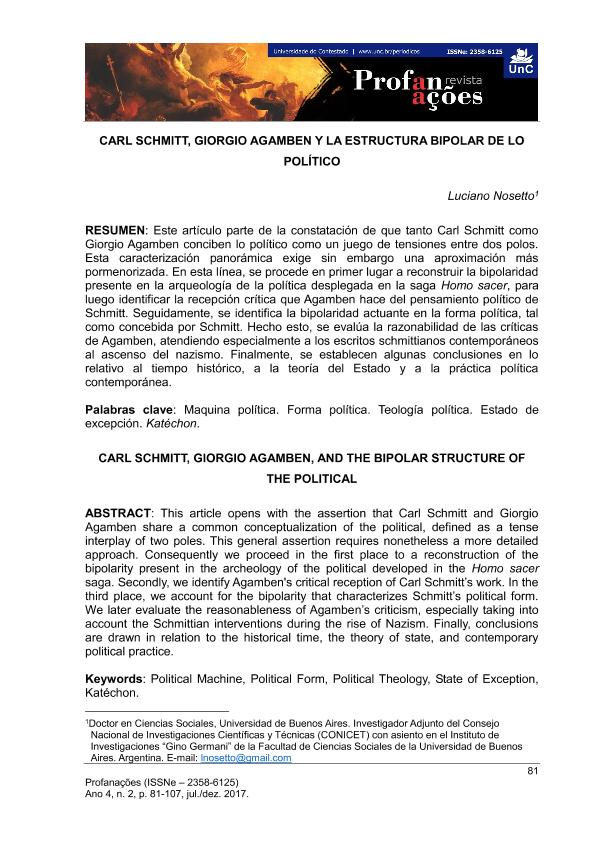Artículo
Este artículo parte de la constatación de que tanto Carl Schmitt comoGiorgio Agamben conciben lo político como un juego de tensiones entre dos polos. Esta caracterización panorámica exige sin embargo una aproximación más pormenorizada. En esta línea, se procede en primer lugar a reconstruir la bipolaridad presente en la arqueología de la política desplegada en la saga Homo sacer, para luego identificar la recepción crítica que Agamben hace del pensamiento político de Schmitt. Seguidamente, se identifica la bipolaridad actuante en la forma política, tal como concebida por Schmitt. Hecho esto, se evalúa la razonabilidad de las críticas de Agamben, atendiendo especialmente a los escritos schmittianos contemporáneos al ascenso del nazismo. Finalmente, se establecen algunas conclusiones en lo relativo al tiempo histórico, a la teoría del Estado y a la práctica política contemporánea. This article opens with the assertion that Carl Schmitt and Giorgio Agamben share a common conceptualization of the political, defined as a tense interplay of two poles. This general assertion requires nonetheless a more detailed approach. Consequently we proceed in the first place to a reconstruction of the bipolarity present in the archeology of the political developed in the Homo sacer saga. Secondly, we identify Agamben's critical reception of Carl Schmitt’s work. In the third place, we account for the bipolarity that characterizes Schmitt’s political form. We later evaluate the reasonableness of Agamben’s criticism, especially taking into account the Schmittian interventions during the rise of Nazism. Finally, conclusions are drawn in relation to the historical time, the theory of state, and contemporary political practice.
Carl Schmitt, Giorgio Agamben y la estructura bipolar de lo político
Título:
Carl Schmitt, Giorgio Agamben and the bipolar structure of the political
Fecha de publicación:
12/2017
Editorial:
Universidad de Santa Catarina
Revista:
Profanações
ISSN:
2358-6125
Idioma:
Español
Tipo de recurso:
Artículo publicado
Clasificación temática:
Resumen
Archivos asociados
Licencia
Identificadores
Colecciones
Articulos(SEDE CENTRAL)
Articulos de SEDE CENTRAL
Articulos de SEDE CENTRAL
Citación
Nosetto, Luciano Ezequiel; Carl Schmitt, Giorgio Agamben y la estructura bipolar de lo político; Universidad de Santa Catarina; Profanações; 4; 2; 12-2017; 81-107
Compartir
Altmétricas




